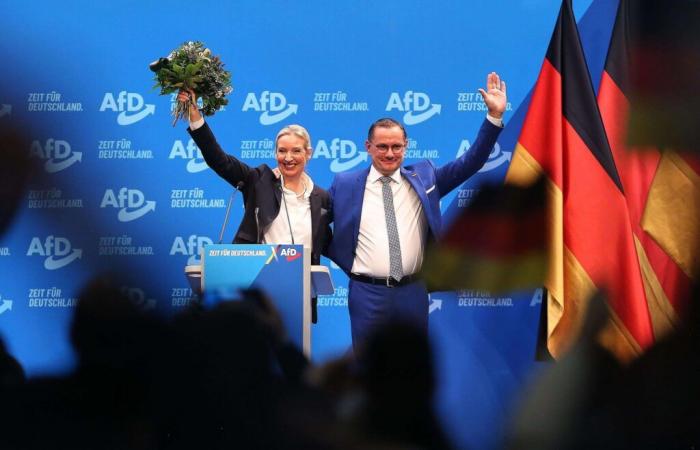
Six weeks before the German legislative elections, the Alternative for Germany (AfD), a nationalist party, is progressing in the polls, moving into second position with 22% of voting intentions. At a congress in Riesa, in the east of the country, Alice Weidel, leader of the party, presented, on Saturday January 11, a political program focused on closing borders, large-scale expulsions and a rejection of European policies, particularly in the areas of migration and energy.
“We will signal the end of the energy turning point and the abandonment of the EU’s climate policy”, declared the candidate for chancellor, whose remarks were relayed by BFMTV. This will be done, in particular, by maintaining coal-fired power stations in the country and by “demolition” wind turbines.
The rest after this ad
“If it is to be called remigration, then it will be called remigration”
The AfD program also includes relaunching relations with Russia, including resuming purchases of Russian gas and repairing the Nord Stream gas pipeline. This orientation reflects the party’s desire to move away from Germany’s traditional Western alignment. The party also plans to leave the European Union and the euro, a measure that the main German political parties categorically reject, refusing any alliance with this party.
The rest after this ad
-Regarding immigration, the AfD plans to “completely close the borders and turn back all illegal immigrants and undocumented immigrants”, “leaving the EU asylum system” et “carry out large-scale evictions”. “If it is to be called remigration, then it will be called remigration”insisted on clarifying the party leader, accepting this concept of mass expulsion of foreign people or people of foreign origin.
Supported by Elon Musk
Demonstrations took place alongside the congress, bringing together thousands of citizens worried about the party’s controversial positions. “The anger of the established parties increases day by day, because we are successful,” insisted Alice Weidel. The recent support of American billionaire Elon Musk, close to Donald Trump, who shares some of the party’s nationalist and anti-migrant positions, has increased the visibility of the AfD, strengthening its influence on the political scene.
The rest after this ad
The rest after this ad
Despite this rise in power, the conservatives of the CDU/CSU remain at the top of voting intentions with 30%, while the Social Democrats of Chancellor Olaf Scholz show a clear decline to 16%.





